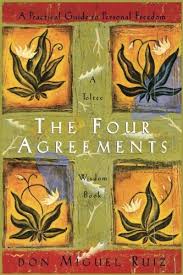Don’t Take Anything Personally
byDon’t Take Anything Personally is the second agreement in The Four Agreements, and it centers on the critical need to detach emotionally from the opinions and actions of others. This principle teaches us that everything people say or do, especially when directed at us, is more about their own internal world—shaped by their beliefs, experiences, and feelings—than it is about us. Ruiz emphasizes that when someone criticizes or reacts negatively, it is often a projection of their own reality and not an objective truth about our character. These judgments are filtered through their personal filters and are not a reflection of who we are or our value. When we internalize others’ opinions and take them personally, we invite unnecessary emotional turmoil into our lives, leading to defensiveness, hurt feelings, and, ultimately, a cycle of suffering. Recognizing this truth allows us to detach from the need to take offense and free ourselves from the emotional weight of others’ words and actions.
The habit of taking things personally is rooted in a false sense of self-importance. We are conditioned from a young age to believe that the world revolves around us and that everything we experience must somehow be related to our actions or behavior. This perception distorts our view of interpersonal relationships, as we assume that others’ words or actions are aimed at us. By buying into this belief, we end up personalizing every interaction and, as a result, taking offense even when none was intended. This mindset fuels unnecessary conflict and emotional upset, making it more difficult to see things clearly. When we choose not to take things personally, we are able to rise above this distorted thinking and cultivate emotional resilience. By stepping away from this deeply ingrained habit, we create a stronger sense of self-worth that is not dependent on external validation or judgments, allowing us to engage with the world more peacefully.
Another essential aspect of the second agreement is the concept of the “mitote,” a term that Ruiz uses to describe the chaotic inner dialogue within our minds. The mitote represents the conflicting beliefs and voices that shape our perception of reality, often leading to confusion and inner conflict. These internal battles mirror the turmoil we experience when we assume that others’ words and actions are aimed directly at us. Our minds become clouded with judgment, and we are left feeling uncertain about who we are or what we stand for. The mitote can distort our true nature, leading us to interpret the actions of others as personal slights or attacks. Ruiz urges us to recognize that this inner noise is a product of our own conditioning and the assumptions we make, and that it is separate from our true essence. By learning to clear the mental fog and not take things personally, we can quiet the mitote and gain greater clarity in how we relate to ourselves and the world.
When we apply the second agreement, we liberate ourselves from the emotional chaos that stems from taking others’ actions and words personally. Instead of being swept up in the tide of external opinions, we begin to develop a stronger internal sense of peace and stability. This shift allows us to see the world with more compassion, not just for others but for ourselves as well. We can then express ourselves freely and authentically, unburdened by the fear of judgment or rejection. When we no longer take things personally, we free ourselves from the limitations of fear, anger, and resentment. This newfound freedom empowers us to make choices based on our true desires and values, not on the need to gain approval or avoid criticism. Ruiz argues that living without taking things personally leads to a more peaceful, fulfilling life, where we can experience joy and love without the emotional weight of others’ opinions weighing us down.
Ultimately, the second agreement serves as a powerful tool for personal growth and emotional freedom. By choosing not to take anything personally, we can stop absorbing the negativity of others, and instead, we can live from a place of self-assurance and emotional strength. It also fosters a sense of independence, as we no longer depend on others’ approval or reactions to validate our worth. This transformation allows us to create healthier relationships, both with others and ourselves. As we cultivate emotional resilience and learn to engage with the world from a position of inner peace, we begin to understand that the actions and words of others are simply a reflection of them, not a reflection of us. By embracing this mindset, we not only free ourselves from the “dream of hell” created by others’ judgments, but we also embark on a path toward true happiness, where we can live authentically and with love in our hearts, unaffected by the negativity around us.


